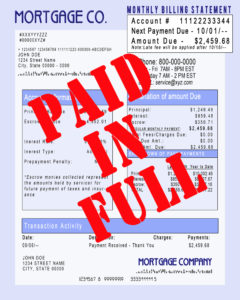
Have you ever thought what if I won the lottery? Or what if I had a million dollars? I’m sure we’ve all thought about what we might do if we had a landfall of money; we might take an extravagant vacation, buy a new car, pay off outstanding debt, but did we also think we might also pay off our mortgage?
Sure the thought may have crossed our mind. If you have enough cash lying around and you’re planning for the future, the thought of being debt- free, may include paying off one of the largest debts many American’s have; your mortgage.
However, if you are not one of the lucky ones who has won the lottery, paying off a mortgage early isn’t always the smartest decision. Often times paying off a mortgage requires us to use up all of our available cash.
If you’re thinking of paying off your mortgage early, here are three things to reconsider.
If you have car loans, school loans, credit card debt or home equity lines of credit those should get paid off first. Some of these debts come with zero-percent financing for a limited time, if that is the case, then absolutely pay them off first.
As a rule, one should have at least enough money in their accounts to cover expenses for six months to a year before applying extra money to the mortgage. While you are paying off debt and working to maximize retirement accounts, a 12-month emergency fund is likely too rich.
We shouldn’t divert money to the mortgage until we are saving a significant portion of our income. When saving for a home you should be saving 20% of your gross income before applying extra cash to the mortgage. The savings can include both retirement savings to IRA and 401 (k) accounts.
One consideration you should think about is the fact that there is no point in paying off the mortgage only to go into more debt for a large purchase.
The reality is you will always have expenses. Even if you were to pay your mortgage off completely, other expenses like insurance, property taxes and maintenance will always be there.
If you pay off your mortgage you will lose out on the tax benefits that come yearly as a result of the mortgage interest you pay.
How liquid will you leave your cash reserves? If you pay off your mortgage you are making your house the only major asset and if you lose your job, get married, have a medical emergency you might set yourself up for the inability to recover any additional expenses that might come up.
Again, it’s too much equity to have stored in one asset, and it can be difficult to sell when you need to move.
There is no right or wrong answer when it comes to the debated question to pay or not to pay off your mortgage. Every person has a set of unique life circumstances. If the mortgage debt is one that keeps you up at night, then by all means, pay it off as soon as possible.
For me, the only valid reason to completely pay off your mortgage at the current interest rate is because you have retired. Even then, depending upon your investments and net worth, it still might not make sense.
The Certo Team
55 N. Arizona Place Suite #103
Chandler, AZ 85225
602-429-6789
